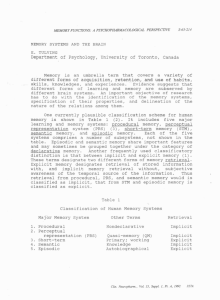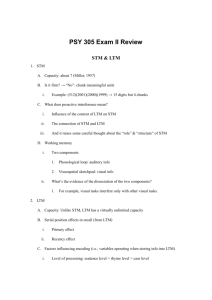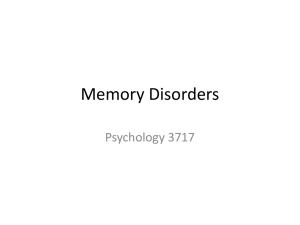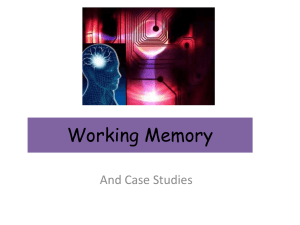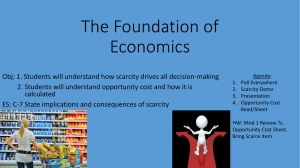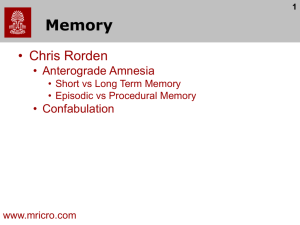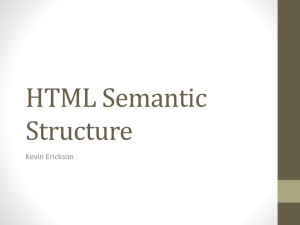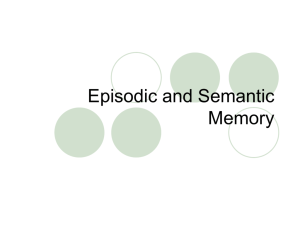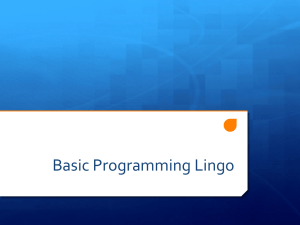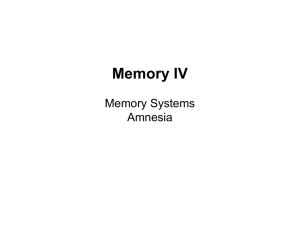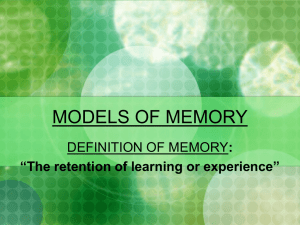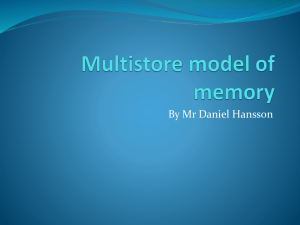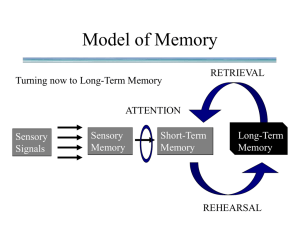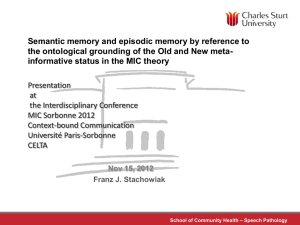Ch 6 LTM structure
advertisement
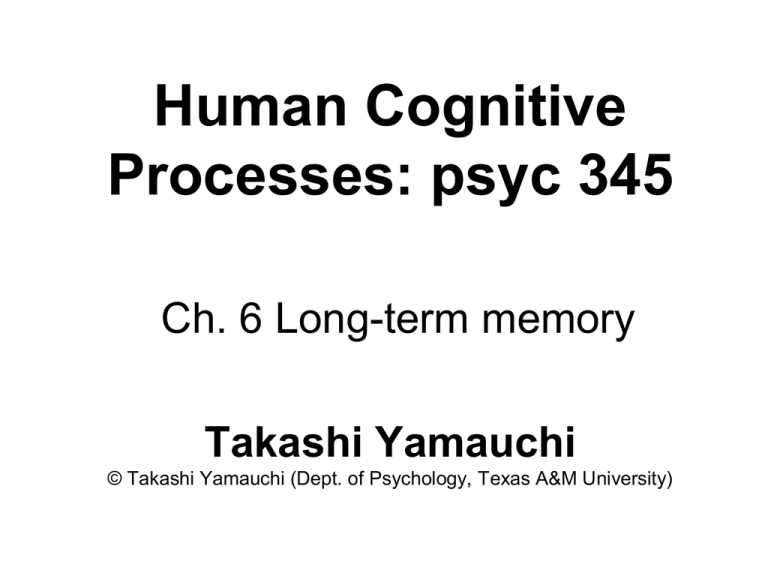
Human Cognitive Processes: psyc 345 Ch. 6 Long-term memory Takashi Yamauchi © Takashi Yamauchi (Dept. of Psychology, Texas A&M University) • (Q1) Is short-term memory and long-term memory anatomically and behaviorally separable? If so, how? • (Q2) Which part of the brain is used for long-term memory, and how do we store long-term memory? • (Q3) Are there different kinds of long term memory systems? • (Q1) Is short-term memory and long-term memory anatomically and behaviorally separable? If so, how? • (Q2) Which part of the brain is used for long-term memory, and how do we store long-term memory? • STM vs. LTM – There are clear distinctions between STM and LTM. – STM and LTM interact constantly. • Demonstration: – CogLab • Serial position memory is better for words presented at the beginning of the list (primacy effect) and at the end (recency effect) Fig. 6-5, p. 182 The dashed curve occurred when the words were presented more slowly no recency effect occurs if the memory test is delayed for 30 seconds (dashed line). Fig. 6-6, p. 183 What does this tell? • Primacy effect – Words are rehearsed during presentation of the list, so they get into LTM • Recency effect – Words are still in STM Distinguishing STM and LTM: Neuropsychological evidence • K. F. (described by Warrington et al.) – STM Impaired, LTM OK • A left posterior temporal lesion – This resulted in an almost total inability to repeat verbal stimuli (digits, letters, words, and sentences) Memory • H. M. – his hippocampus is surgically removed. • Impaired: – H. M. cannot retain information about events that happened after the operation. • Intact – intelligence (IQ), attention, concentration, language and motivation levels were intact. – good memories about several weeks before the operation. Hippocampus Selectivity of memory loss • H. M. – before the operation – remembered which elementary school he went, the names of friends in his high school days, TV programs he saw when he was a child. – Had no idea about what he did, whom he met, what he saw, and what he talked last months, last week, or even a few hours ago. H.M. • Memory dissociation – – – – – H.M.’s IQ 118 Language comprehension normal Motor learning normal Problem solving and practice normal H.M. had good memory about the events and incidents he experienced before the surgery. – H.M. hardly remember what happened to him after the surgery H.M. (continued) • H.M. was severely impaired in one type of memory, • such as the memory about specific events, – but his memory about motor skills and other learning is intact. Mirror-reversed word triad • (Q3) Are there different kinds of long term memory systems? • Organization of LTM Declarative (explicit) vs. Implicit memory • Declarative (explicit) memory – Is our conscious recollection of events or facts we have learned • Implicit memory – Memory without conscious awareness • Episodic: memory for personal events – Episodic involves mental time travel – You can trace down the time frame of your episodic experience. • Semantic: facts and knowledge – Semantic memory does not involve mental time travel The separation of episodic & semantic memories • Episodic can be lost, leaving only semantic – Acquiring knowledge may start as episodic but then “fade” to semantic • Semantic memory can be lost, while episodic memory is intact. – A brain damaged patient knows what she did yesterday, or 10 days ago but don’t remember meanings of words. Separate brain activation for episodic and semantic memory • Fig. 6.8 Blue areas are associated with semantic memory Connection between Episodic & Semantic Memories • Semantic Memory can be enhanced if associated with episodic M. – Personal semantic memory: semantic memories that have personal significance • Episodic Memory can be enhanced if associated with semantic M. – Extracting meaning (e.g., story) enhance our memory. Implicit memory • Implicit memory – Memory without conscious awareness • CogLab • Implicit learning Neuropsychological evidence • Movie: • DVD: How does your memory work? (chapter 3; 7:09) Implicit or Explicit Memory Tasks • Explicit memory tasks – Involves conscious recollection – Participant knows they are trying to retrieve information from their memory • Implicit memory tasks – Require participants to complete a task – The completion of the task indirectly indicates memory implicit memory tasks • Mirror tracing • Mirror reversed reading • Identifying degraded words • http://www.psywww.com/intropsych/ch06_me mory/implicit_vs_explicit_memory.html Tulving, E., Schacter, D. L., Stark, H. A. (1982). • Priming and implicit memory • Test implicit memory and explicit memory – Stimuli: • 96 words – Design: • 3 phases: Learning phase & test phase (1hr) • & test phase (7 days later) Tasks • Phase I (Learning) – Ss studied 96 words (5sec/word) – Ss were told that they would be tested with their recognition memory. – Ss could study the words in whatever way they like. Fig. 6-10, p. 194 Learning a new skill: mirrorreverse reading Mirror-tracing Reading degraded words Warrington (1968) • 5 patients with Korsakoff’s syndrome – deficit in declarative memory • Give them incomplete pictures and let them learn how to identify the fragmented pictures. Show (a), and then (b), (c),.. so on until they were able to identify the picture Fig. 6-11, p. 194 Fig. 6-12, p. 195 Implicit memory in everyday experience • Mere exposure effect / propaganda effect • You form a positive feeling to things that you experienced before. Perfect & Askew (1994) • Participants scanned ads in a magazine. • They rated how appealing the ads were. • Results: Participants gave higher ratings to the ones they had been exposed to than to the ads they had never seen. • This happened even when they recognized 2.4% of the original 25 ads. • Masked priming: demonstration • http://www.u.arizona.edu/~kforster/priming/ind ex.htm H.M. • Memory dissociation – – – – – H.M.’s IQ 118 Language comprehension normal Motor learning normal Problem solving and practice normal H.M. had good memory about the events and incidents he experienced before the surgery. – H.M. hardly remember what happened to him after the surgery Hippocampus Initial state Goal state • Tower of Hanoi solution • http://www.youtube.com/watch?v=aGlt2GDC8c • H. M got better at doing the Tower of Hanoi game even though he did not remember at all about his previous trials.
